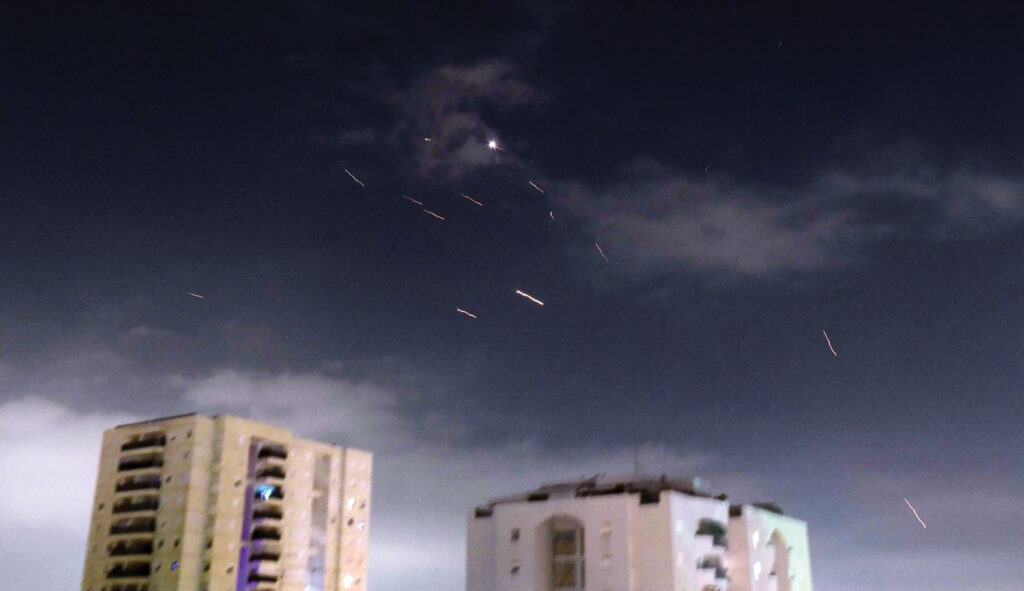In a shocking act of provocation, the Islamic Republic of Iran sent more than 200 drones and missiles screaming over the Israeli sky. Thankfully, Israel and its allies intercepted a vast majority of them, and casualties were kept to a minimum. If Iran’s goal was to kill as many Israelis as possible, it failed in this attack.
More surprising than the success of Israel’s defensive operations was the role Arab states played in them. Jordan, one of Israel’s Arab neighbor states that has been critical of the Gaza war, reportedly shot down dozens of Iranian drones in its airspace. And after the attacks, a Saudi official harshly condemned the Iranian regime, even accusing it of engineering the war in Gaza to prevent diplomatic normalization with Israel. It would seem that, at least for the moment, Arab leaders have quietly decided to join Israel’s fight against Iranian aggression.

President Joe Biden has reportedly told Israeli Prime Minister Benjamin Netanyahu that the United States “will not participate in any offensive operations against Iran” in response to the attack. The administration likely fears further escalation, but this is a mistake. Jordan’s willingness to support Israel and the Saudis’ willingness to speak out against Iran reveal just how isolated the Iranian regime has become. Arab states have had enough of the ayatollahs and could prove vital to ending their reign of terror.
To contain further aggression, Israel and its Arab neighbors’ best option is a commitment to working together. Iran is their mutual enemy. Despite historic animosities and present grievances, it is in everyone’s interest to present a united front. Only cooperation between regional powers can contain the Iranian threat, and only American leadership can bring all these countries to the table.
Reaching some kind of collective defense arrangement will certainly be an uphill battle. A formal agreement may even be impossible. Although Israelis and Arabs were groping toward rapprochement with the Abraham Accords, Hamas’s vicious Oct. 7 attacks disrupted the process. As much as Arab leaders may want to achieve some kind of normalization with Israel, public opinion in their countries, which generally identifies with the goals of Palestinian nationhood, constrains their diplomatic options somewhat. But Iran is a danger unlike anything the Middle East has faced before. Its fanatical goals know no limits.
Iran’s determination to gain regional hegemony is the biggest problem. For decades, Grand Ayatollah Ali Khamenei and his acolytes have sought to spread the vile “Islamic Revolution” and extremist Shiite beliefs across the Middle East. Iran will not stop with attacks on Israel: It fully intends to destabilize Arab countries such as Jordan or Saudi Arabia, too, and force them into submission.

It is important to recognize the ugly ideology motivating Tehran’s aggression. The regime came to power in 1979 through a violent revolution that deposed the rightful monarch. Led by the Islamist cleric Ruhollah Khomeini, the revolution combined anti-Western fervor with radical sectarian religion. In contrast with Arabs, who are mostly Sunni Muslims, the Persian ayatollahs who seized control of Iran are Shiite. They had a radical vision for a world governed completely by their narrow interpretation of Shariah and even denounced non-Shiite Muslims as heretics. In the years since Khomeini’s death, Shiite violence against Sunnis has increased considerably.
Despite the ayatollahs’ sectarianism, they have been using anti-Western sentiment to build what they call an “Axis of Resistance” across the Middle East. Tehran has sought to work with Sunni extremists such as Hamas or certain groups of Syrian fighters. From a military angle, the Iranian regime mostly uses these proxies conveniently to wage war against the U.S., Israel, and regional rivals. It has also tried to deploy the “Axis of Resistance” to cultivate goodwill throughout the Muslim world as part of a sick public relations campaign. The regime hopes that by “leading the fight” against Israel and the U.S., it can win the support of the Arab people. This heroic anti-imperialist image, however, is built on a lie. The Iranian regime has been nothing short of a disaster for the Muslim world.

Tehran may be targeting Jews right now, but Arabs are the collateral victims of its terrorism campaign. One of the victims from this weekend’s attacks, for instance, was an innocent 7-year-old Bedouin girl in southern Israel. She joins the hundreds of thousands of other Arab casualties caused by Iran or its proxies in their decades of state-sponsored terrorism. From violence in Syria and Iraq to the Houthi rebellion in Yemen, Iranian support has been vital to horrific acts of violence committed against Sunni Arabs. No one in the Middle East will be truly safe if the Iranian threat is permitted to fester unabated.
The recent attacks also underscore how little the so-called Islamic Republic cares about the actual Islamic world. Several Iranian missiles could have hit the al Aqsa Mosque, one of the holiest sites in the world for the Muslim faithful. Fundamentalist religion may be one ingredient in the Iranian regime’s toxic ideological stew, but it has no real piety or respect for Muslims outside its narrow sect. The ayatollahs cannot even keep religiously significant places safe from their campaign of terror. They are certainly not going to lead the Islamic world into another golden age.
Putting a stop to Iranian expansionism, then, is a matter of survival for both Israel and its Arab neighbors. So long as Tehran seeks to export revolution across the globe, everyone’s national security will be endangered. This threat has gone on long enough. It is high time for the imperiled parties to work together in a coalition, formal or informal, to beat back the Islamic Revolution.
The U.S. can play a key role in assembling this coalition. Continued displays of military strength will demonstrate to all the regional players, friends and foes alike, that America will not simply abandon the region at the first sign of trouble. Resolve will ward off Chinese and Russian meddling — the U.S. cannot allow Iranian aggression to form a vacuum global rivals can fill. Smart diplomacy from Washington can help persuade Arabs and Israelis alike to put their common interests first. Above all, the world’s sole superpower can give the coalition strategic direction and set achievable goals for containing Iran.
First, such a coalition could help Israel plan and execute a proper response to Iran’s direct attacks. The Iranian regime will likely use social media to depict itself as a victim no matter what Israel does, but there are steps Arab governments can take to limit blowback in the wider Muslim world. Arab states may also provide limited military support if they are convinced it could mitigate threats to their own security. Whatever shape the response takes, it will be stronger if regional actors do it together.
Next, the coalition must take steps to ensure that Iran never acquires a nuclear weapon, even if it requires military action. The direness of the situation cannot be understated. Some analysts believe that the regime could achieve a nuclear breakout in as little as a week. If Iran were to arm itself with weapons of mass destruction, it would attain an unacceptable strategic advantage over its regional enemies. Israel has been diligently watching the Iranian nuclear program for some time now, but attempts to disrupt it would gain greater legitimacy if they were done in coordination with Arab partners.
But the Iranian regime has other, more conventional means to spread terror, and reprisals ought to target these as well. In the weekend’s attack, Iran deployed a number of kamikaze drones, such as the Shahed-136 and the Shahed-131. In recent years, Iran has been acting as an “arsenal of autocracy” and exported these unmanned aerial vehicles to other powers, including Vladimir Putin’s Russia and Islamist groups, to wage a proxy war against American interests. From Ukraine to Israel, Sudan to Saudi Arabia, Iranian drones are sowing chaos and inflicting death and destruction on those fighting to preserve the world order. But an Arab-Israeli coalition, with assistance from the U.S., could stage cyber and kinetic strikes against Iranian drone production facilities to disrupt the regime’s ability to replenish their stockpiles and support their proxies in other theaters of conflict with the West.
Finally, the Arab-Israeli coalition should work more widely to deconstruct Iran’s vast terrorism network in the Middle East. From Tehran, cash, weapons, and strategic orders flow to Islamist groups such as Hamas, Hezbollah, and the Houthis, which indiscriminately target both Israelis and Arabs, as well as American troops in the region. A coalition could cut off the flow of support and decapitate the groups themselves. The U.S. can help by actually enforcing sanctions on the Iranian regime, as well as providing vital intelligence and operations support. The world does not have to tolerate Iran’s aggression by proxy. The response to the weekend’s attacks is an opportunity to degrade, and begin the process of defeating, the “Axis of Resistance.”
Biden’s hostility to Israeli retaliation is motivated, at least in part, by his reluctance to involve the U.S. in yet another conflict more deeply. With one war raging between Ukraine and Russia in Europe and another brewing in the South China Sea, it is an unavoidable fact that American resources are stretched thin at the moment. Voters are weary of conflict as well, and Biden clearly feels as though he has a mandate to keep the U.S. out of war.
Avoiding a Middle East quagmire is an admirable goal, and it is precisely why the administration should invest diplomatic and military capital into some kind of Arab-Israeli coalition. By letting strategic regional partners take the lead, Biden would be empowering them to strike back at the Islamic Republic without overcommitting American troops or resources. This is one option America could take to restore the world order without playing the world’s policeman.
If the Biden administration is unwilling to lead this effort, however, it is still in Arabs’ and Israelis’ best interests to find ways to work together against the Islamic Republic. Democrats, including Biden and Senate Majority Leader Chuck Schumer (D-NY), seem more committed to constraining Israeli security policy to prevent “escalation” than helping it win its war against Hamas or Iran. They remain too committed to the failed framework of former President Barack Obama’s Iran nuclear deal. While it would be best if the U.S. gave full support to however our regional partners respond to the latest attacks, Israel must be prepared to forge its own new partnerships and take necessary action without Biden’s blessing.
CLICK HERE TO READ MORE FROM THE WASHINGTON EXAMINER
To be clear, joint Arab-Israeli efforts to contain Iran will not instantaneously solve every problem facing the Middle East. Thorny questions about Palestinian nationhood and Israel’s place in the broader region will no doubt cause continued tensions far beyond the foreseeable future. A shared opponent does not mean that centuries of distrust and conflict will simply melt away. But the point of defanging Iran is not to bring about utopia. It is simply to address a clear and present danger.
The Iranian attacks are some of the most naked acts of aggression in the regime’s entire history. As if more proof were somehow needed, it lay bare the extent to which the Islamic Republic has been viewing the entire Middle East as its own playground. Regional leaders, Arab and Israeli alike, empowered by American support, need to take these attacks seriously and put a stop to Iran’s insane ambition.
Michael Lucchese is a Krauthammer fellow at the Tikvah Fund and the founder of Pipe Creek Consulting.
